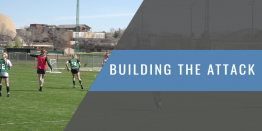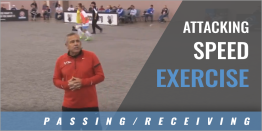|
Mental Toughness What is it? How do you get it? by Simon Hartley- Be World Class Originally published in The Soccer Journal - The Official Publication of NSCAA
But what exactly is it? How do we recognize players who display it and how can we develop mental toughness in our players? I believe that the first step is to understand what genuine mental toughness is and is not. What do tough players look like, sound like and behave like? Some people would say that the tough players are those who shout the loudest and bang their fists on the locker room doors. They are the players who try to intimidate their opponents, physically and verbally. Are those players really mentally tough? What about players who push themselves physically, put their body on the line and risk injury? Are those the tough players? As a sport psychologist, I have always been fascinated by mental toughness. I often see players and teams who crumble when they hit tough challenges. I have seen some teams that have imploded at crucial times during a game, or during a season. Some panic if they fall behind or when they have a bad run of form. Some even panic when they find themselves exceeding their expectations. They go to pieces when they make finals or find themselves fighting for a league championship. Some teams seem to throw their game plan out of the window when the opposition presents obstacles. What happens when Plan A doesn't work as expected? How do the players respond? For many years, I defined mental toughness as the ability to stick to the game plan, no matter what. l recognize that "the game plan" needs to be flexible and adaptable. However, we should not abandon it completely and panic at the first sign of trouble. How do athletes respond to criticism? What happens if that criticism comes from 40,000 screaming fans on a Saturday afternoon? What if the television, newspapers and media compound it? The coaching staff of a Premiership football club once developed a saying, "When the going gets tough, the tough hide under the treatment table." The number of injuries would rise (and take longer to heal) when the team was struggling and the fans were booing the players. The players were actually using the treatment room as an escape! Coincidently, the captain (who did the shouting and fist-waving) was the most regular visitor to the treatment room if we lost at home. Perhaps the genuinely tough players are not the ones who make most noise, shout loudest, wave their fists and bang on the dressing room doors. Maybe those are not the best indicators of true mental toughness. When I see tough players, fists aren't banging. In fact, the toughest players I've seen tend not to be physically or verbally intimidating. Maybe they don't need to be. Instead, the players who show true mental toughness tend to display three distinct qualities. 1. RESILIENCE: Commonly seen as "bounce-back-ability" and the capacity to thrive in adverse situations. 2. TENACITY: The ability to keep going and push to the limit. 3. COMPOSURE: The ability to make good decisions and execute skills to a very high standard, while "under pressure." To me, these qualities characterize mentally tough players. As a sport psychologist, look at how players respond when they hit challenges. I believe that actions, rather than words, are the best indicators. Here's a simple example - do players opt to do what's easiest, or what's best? Will they push themselves to do everything they can, or just do what's necessary? A player's actions on a daily basis can tell us a lot. What happens when they encounter the really tough challenges? For example, how would they respond if they suffered a serious injury? How do they respond to criticism or when they make mistakes? Will they become despondent? What about a poor run of form? Will they come back stronger, or will they wither? Do they tend to hide? Do you hear excuses and blame or see players taking responsibility? In a Premiership dressing room at half time, 1 once heard a player explain that it was not his fault he'd played poorly in the first half. The equipment manager was to blame because he'd given the player a long sleeved shirt, and he couldn't play in long sleeves. What about if the team was 4-0 down with 15 minutes to go? Would they take their foot off the gas and give up or fight to the very end? I recently saw my hometown team in exactly this position. They imploded and ended up losing 6-0. How do players respond in "pressurized" situations? Would they lose the plot, or would they be able to produce a peak performance? The answers to these questions will tell us a lot about mental toughness in players. Often the toughest players are not the ones who shout loudest, make the most noise or appear the most intimidating. Sometimes fear can be dressed up as toughness. Bravado tends to be a facade; "fake toughness." I suspect that it is a sign of weakness rather than strength. Mentally tough players often are the ones who step forward and take responsibility. They will respond to setbacks by applying themselves, focusing, practicing, training and preparing better. When you know what to look for, mental toughness is fairly easy to spot. Like any skill, mental toughness can be developed and learned. It is not simply an attribute that is inherent in people. Therefore, coaches can actually help to foster mental strength and toughness in their players, and players can develop it in themselves. Once we understand what genuine mental toughness looks like, we have a fantastic starting point! Simon Hartley is a sport psychologist and performance coach at Be World Class. He has worked at the highest level of sport, from Premiership football and rugby union to Olympic sport, golf, tennis and even motor sport to get their mental game right. He also the author of two books, Peak Performance Every Time (published by Routledge in 2011) and his second, entitled Be World Class due in 2012. |
|
|






